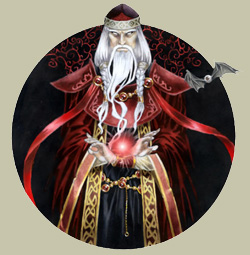Sorcerer
Hybrid spell users who rely on both the Elemental and Spiritual Spheres, Sorcerers concentrate on spells of disruption and destruction. Their primary spells deal with the annihilation of animate and inanimate matter. While this is a difficult profession to learn early on, Sorcerers have the potential to be extremely powerful and deadly.
Professional Highlights
The two primary foci of sorcerous magic are Demonology and Necromancy.
Offensive Spells
Since its inception by the Faendryl elves at the end of the Undead War, sorcerous magic has focused heavily on destruction. In the past, it was said of sorcerers that they could not learn as many utility and defensive spells as do wizards or clerics. Whether that is still true or not, sorcerers are acknowledged to command numerous fearsome offensive powers.
Some of the staple sorcerer attack spells include:
- Mana Disruption (702) - low level universal warding attack
- Disintegrate (705) - warding attack, more effective with Necromancy lore
- Energy Maelstrom (710) - maneuver attack
- Pain (711) - warding attack, more effective with Necromancy lore
- Balefire (713) - bolt attack, more effective with Demonology lore
- Evil Eye (717) - warding attack, chance to cause enemies to instantly drop dead out of fear
- Dark Catalyst (719) - warding attack that turns enemies' mana against them
- Implosion (720) - maneuver attack, chance to completely vaporize enemies, more effective with Demonology lore
Sacrifice
A sorcerer can SACRIFICE weakened creatures, converting their animus into usable mana.
Scroll Infusion
Scroll Infusion allows sorcerers to increase the charges of arcane scrolls.
Demonic Summoning
Sorcerers learn to summon minor demons to aid them in both mundane tasks and magical combat. This ability is more effective for sorcerers who have trained in Demonology lore.
Animate Dead
Animate Dead (730) allows sorcerers to temporarily animate the bodies of dead creatures or adventurers. Creature animates can aid the sorcerer in battle, while animated adventurers will follow the sorcerer for a while, usually as a way to rescue the fallen when they are far from the safety of towns. This ability is more effective for sorcerers who have trained in Necromancy lore.
Animates are not considered true undead as they are not bound to a soul.
Planar Shift
Sorcerers can use a form of planar teleportation to take them, and potentially their group, to almost any specified point in the world. This ability is more effective for sorcerers who have trained in Demonology lore.
Planar travel is inherently unsafe, and the untrained and unprepared run a high risk of injury, death, or worse!
Ensorcellment
Ensorcell (735) is the sorcerer profession service. Sorcerers store necrotic energy as they gain experience, which they can then infuse into weapons, shields, and armor. Ensorcelled weapons (including runestaves for spellcasters) gain necrotic flares that confer various benefits, while shields and armor become better able to withstand hostile magic.
Sorcerer Guild
The Sorcerer Guild is a profession guild dedicated to the arcane studies and development of sorcery worldwide.
The skills taught by the guild are Alchemy and Illusions.
Guilds also provide a summoning chamber.
Sorcerer Statistic Growth Rates
For more information see the page on Statistic growth rates.
| Profession | Strength | Constitution | Dexterity | Agility | Discipline | Aura | Logic | Intuition | Wisdom | Influence |
|---|---|---|---|---|---|---|---|---|---|---|
| Sorcerer | 10 | 15 | 20 | 15 | 25 | 30 | 25 | 20 | 25 | 20 |
Note: The table above is the baseline statistic growth rates. These values are actually modified for every race in GemStone IV, including humans.
Profession Verbs
Sorcerers have a special setting for:
- GAZE <person, creature, item> - You shift your eyes to <person>.
You can set a verb by using: <verb> set profession
Resources
Guides
- A beginner's guide to playing a sorcerer
- Pure sorcerer
- Comprehensive Sorcerer Guide
- Sorcerer training suggestions
- Goat's Mutant Sorcerer Guide - for the rare few who want to use a weapon
- GameMaster/Development Team Sorcerer Proposal
Saved Posts
Player Essays
| Sorcerer Profession - edit |
|---|
| Spell Circles: Sorcerer Base Spells | Minor Elemental Spells | Minor Spiritual Spells |
| Professional Highlights: Warding spells | Bolt spells | Scroll Infusion | Ensorcell | Demonic summoning | Animate Dead |
| Profession - edit |
|---|
| Squares: Rogue | Warrior | Monk |
| Semis: Bard | Paladin | Ranger |
| Pures: Cleric | Empath | Sorcerer | Wizard |
